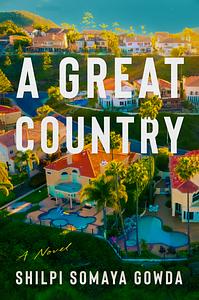Take a photo of a barcode or cover
challenging
emotional
fast-paced
An interesting perspective on issues of race and policing in America.
A Great Country by Shilpi Somaya Gowda had a great concept, but I struggled with the execution from cover to cover. The beginning of the book has a strong open with tensions building, but around half way through it looses it's focus and never quite gets back to where it should be. I think it's a case where the messaging overshadows the story and while the messaging is important (and totally relevant given the state of affairs) it's hard to consume when you struggle to connect with the characters. Also, the cop at the end felt more like a caricature than a character.
I want more books like this because, again, I think the messaging is really important and needs to be spread far and wife; but messaging can't come at the expense of the story because those who needs the messaging most, will put it down because it's so front heavy.
Thank you Mariner Books for the gifted copy to review.
I want more books like this because, again, I think the messaging is really important and needs to be spread far and wife; but messaging can't come at the expense of the story because those who needs the messaging most, will put it down because it's so front heavy.
Thank you Mariner Books for the gifted copy to review.
emotional
reflective
fast-paced
Plot or Character Driven:
Character
Strong character development:
Yes
Loveable characters:
No
Diverse cast of characters:
Yes
Flaws of characters a main focus:
Complicated
Incredibly readable with an Important premise but not exactly revolutionary.
This novel is hinged on the life of an American Indian family, which includes, Ashok and Priya and their 3 children, Deepa, Maya and Ajay. Ashok and Priya moved to US 20 years ago, and have now settled in Pacific Hills, a new upscale neighbourhood in Southern California. Ajay, their youngest son (14 years), gets arrested and then rest of the story is about how the situation rapidly unfolds for the family over next few of weeks.
The first half of the novel builds the tension of the situation as the Shahs are informed of their son's arrest and they go to visit him in county jail, all within the span of few hours. The police reluctantly build a case to investigate Ajay's room, media catches a whiff of the arrest and connect it to affirmative action, Priya blames Ashok for bad parenting decisions of the past, Deepa and Maya both caught up in their own mini scandals, old alliances with families in Irvine are rekindled and new bonds are put to the test. Overall, pretty dramatic few weeks for a regular immigrant Indian family.
And this is where, i start doing my own clinical analysis of the situation.
It's difficult migrating to a new country and raising your children without extended family support. It takes up all your energy to continue living the model minority cultural trope till you gain acceptance in America. This all-consuming task often blinds families to deeper realities of their own life as they over-emphasize on projecting a great image to keep climbing the social ladder.
Alot of Maya and Ashok's reactions to their children's behavior felt very conservative to me. Priya’s character and motivations were most fleshed out but the rest of the characters felt weak. Deepa's rebellion in wanting to be part of a protest didn't feel like a strong enough rebellion to me. Maya's attempt at fitting in with the "in" crowd in Pacific Hills didn’t feel as uncharacteristic as it could've been. Kids these days do far stranger things than depicted in the novel. I did empathize with Ajay's neurodivergence... but i wish there would've been more exploration from his perspective. Felt it was woke but not enough to drive a message home.
The family does come together in the end to resolve matters in the best possible way. But it lacked a punch and I had to really push myself to finish the book, which is never a great sign. I wonder if my dislike of the novel was a personal distaste for the general problem with the NRI community's tendency to hold onto out-of-date Indian traditions and values. Or because, it just lacked a punch? Maybe, this story was not meant for me.
The first half of the novel builds the tension of the situation as the Shahs are informed of their son's arrest and they go to visit him in county jail, all within the span of few hours. The police reluctantly build a case to investigate Ajay's room, media catches a whiff of the arrest and connect it to affirmative action, Priya blames Ashok for bad parenting decisions of the past, Deepa and Maya both caught up in their own mini scandals, old alliances with families in Irvine are rekindled and new bonds are put to the test. Overall, pretty dramatic few weeks for a regular immigrant Indian family.
And this is where, i start doing my own clinical analysis of the situation.
It's difficult migrating to a new country and raising your children without extended family support. It takes up all your energy to continue living the model minority cultural trope till you gain acceptance in America. This all-consuming task often blinds families to deeper realities of their own life as they over-emphasize on projecting a great image to keep climbing the social ladder.
Alot of Maya and Ashok's reactions to their children's behavior felt very conservative to me. Priya’s character and motivations were most fleshed out but the rest of the characters felt weak. Deepa's rebellion in wanting to be part of a protest didn't feel like a strong enough rebellion to me. Maya's attempt at fitting in with the "in" crowd in Pacific Hills didn’t feel as uncharacteristic as it could've been. Kids these days do far stranger things than depicted in the novel. I did empathize with Ajay's neurodivergence... but i wish there would've been more exploration from his perspective. Felt it was woke but not enough to drive a message home.
The family does come together in the end to resolve matters in the best possible way. But it lacked a punch and I had to really push myself to finish the book, which is never a great sign. I wonder if my dislike of the novel was a personal distaste for the general problem with the NRI community's tendency to hold onto out-of-date Indian traditions and values. Or because, it just lacked a punch? Maybe, this story was not meant for me.
emotional
hopeful
informative
inspiring
emotional
reflective
tense
medium-paced
Plot or Character Driven:
A mix
Strong character development:
Complicated
Loveable characters:
Complicated
Diverse cast of characters:
Yes
Flaws of characters a main focus:
Yes
This story is important and impactful. The writing was simple, but strong, though it did tell more than show. I found almost all the character's annoying or a bit much, and would usually know a star off for it, but somehow, I think it still deserves the stars, because I can maybe understand why they were presented that way. While the story was complex, it did wrap up too nicely, which I don't believe is a true reflection of reality. At times I felt there was too much going on, and not enough detail to buy in to some parts. Overall, it tells an important story that is timely.
Graphic: Racism, Xenophobia, Police brutality, Grief
Moderate: Ableism, Bullying, Emotional abuse, Toxic relationship, Islamophobia, Gaslighting, Classism
Minor: Sexual assault
informative
reflective
tense
fast-paced
Plot or Character Driven:
A mix
Strong character development:
Yes
Loveable characters:
Yes
Diverse cast of characters:
Yes
Flaws of characters a main focus:
No
Wow. On top of the powerful and important story, the author’s writing style is so impactful. Highly recommend.





